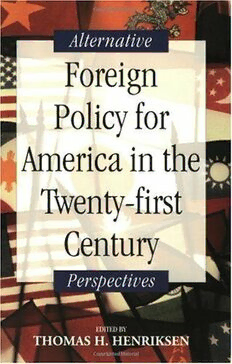
Foreign Policy for America in the Twenty-first Century: Alternative Perspectives PDF
159 Pages·2001·66.429 MB·English
Most books are stored in the elastic cloud where traffic is expensive. For this reason, we have a limit on daily download.
Preview Foreign Policy for America in the Twenty-first Century: Alternative Perspectives
Description:
Since the disintegration of the Soviet Union, questions have arisen as to which course the United States should sail in the new international order. In this volume, some of the nation's foremost foreign policy experts present carefully crafted and bold perspectives of what America's global role should be. All contributors—leading authorities in the fields of economics, history, international relations, and political science—offer alternative viewpoints. These sharply drawn approaches permit the general reader and scholar alike to glean an understanding of the main schools of thought about American foreign policy today. They are written in accessible prose without esoteric language or scholarly jargon. The past decade witnessed a transition from an era of bipolar confrontation with the Soviet Union to a new and still-emerging epoch. Although American economic, military, and diplomatic influence stood unrivaled in the past decade, the future looks much less predictable. The unique insights represented in this volume will help inform the reader about possible courses America can navigate in uncharted seas. Rogue states, humanitarian interventions, terrorism, major and middle powers, international organizations, global trade agreements, and other political and economic developments are analyzed in the context of the policies recommended in this volume. The perspective spans the spectrum from global activism to antiglobalization.
See more
The list of books you might like
Most books are stored in the elastic cloud where traffic is expensive. For this reason, we have a limit on daily download.
